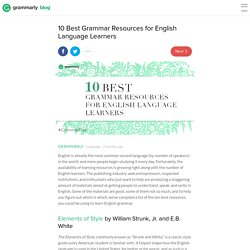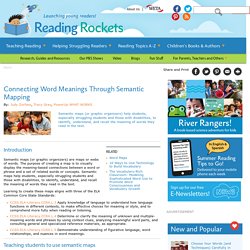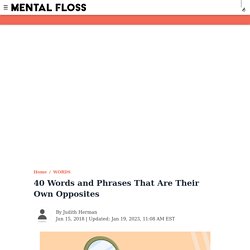

10 Best Grammar Resources for English Language Learners. English is already the most common second language (by number of speakers) in the world, and more people begin studying it every day.

Fortunately, the availability of learning resources is growing right along with the number of English learners. The publishing industry, web entrepreneurs, respected institutions, and enthusiasts who just want to help are producing a staggering amount of materials aimed at getting people to understand, speak, and write in English. Some of the materials are good, some of them not so much, and to help you figure out which is which, we’ve compiled a list of the ten best resources you could be using to learn English grammar. Elements of Style by William Strunk, Jr. and E.B. White The Elements of Style, commonly known as “Strunk and White,” is a classic style guide every American student is familiar with. Oxford Modern English Grammar by Bas Aarts Purdue Online Writing Lab. Evidence-Based Vocabulary Instruction - Speech Room News. Connecting Word Meanings Through Semantic Mapping. Semantic maps (or graphic organizers) are maps or webs of words.

The purpose of creating a map is to visually display the meaning-based connections between a word or phrase and a set of related words or concepts. Semantic maps help students, especially struggling students and those with disabilities, to identify, understand, and recall the meaning of words they read in the text.
{5 Steps Series} 5 Simple Steps for Effective Vocabulary Instruction l Dr. Kimberly's Literacy Blog. We know that there is a strong relationship between vocabulary, reading comprehension, and high student achievement. Systematic vocabulary instruction is an integral part of a K-12 comprehensive literacy framework for instruction. Further, word learning is connected at the hip to teaching content at any level. Increasing your vocabulary of words to describe your emotional states. How are you feeling?

How many emotional states do you know? Which words do you use to communicate how you feel? Increasing your vocabulary of words to describe your emotional state can improve your emotional intelligence & well being. When you’re able to more clearly understand the exact emotion you’re feeling, by describing it with the right words, you’re then able to respond to it accordingly. For example, if you start feeling angry, you’ll know, generally that you might want to calm down. Experts in any field have their own advanced vocabulary, that they know better than anyone else to describe exactly what’s going on. Next time you’re feeling something, anything, try using this feeling wheel. Related. VocabGrabber : Thinkmap Visual Thesaurus. Word Invasion. 10 Words You Need to Stop Misspelling. The Alot is Better Than You at Everything.
As a grammatically conscientious person who frequents internet forums and YouTube, I have found it necessary to develop a few coping mechanisms.

When someone types out "u" instead of "you," instead of getting mad, I imagine them having only one finger on each hand and then their actions seem reasonable. If I only had one finger on each hand, I'd leave out unnecessary letters too! If I come across a person who seems to completely ignore the existence of apostrophes and capital letters and types things like "im an eagle and im typing with my talons, so dont make fun of me cuz this is hard," I like to imagine that they actually are an eagle typing with their talons.
It would be a hassle if you had to hop in the air and use your feet to karate-chop two keys simultaneously every time you wanted to use the shift key to make a capital letter. Also, eagles lack manual dexterity, so I can understand why they'd want to leave out apostrophes. The Alot is incredibly versatile.
Lexipedia - visual dictionary. Student Resources—Word Parts—Greek Roots. What is a Pronoun? Welcome to HyperGrammar electronic grammar course at the University of Ottawa's Writing Centre.

This course covers approximately the same ground as our English department's ENG 1320 Grammar course. The content of HyperGrammar is the result of the collaborative work of the four instructors who were teaching the course in Fall 1993: Heather MacFadyen, David Megginson, Frances Peck, and Dorothy Turner. David Megginson was then responsible for editing the grammar and exercises and for converting them to SGML. This package is designed to allow users a great deal of freedom and creativity as they read about grammar. HyperGrammar allows users to create and follow their own lines of thought. This package is currently under construction! Please read the Copyright and Terms of Use before you begin using HyperGrammar, and note that we provide NO WARRANTY of the accuracy or fitness for use of the information in this package. * This site uses the Oxford dictionary spelling. 10 Words You Need to Stop Misspelling.
25 Words That Are Their Own Opposites. Here’s an ambiguous sentence for you: “Because of the agency’s oversight, the corporation’s behavior was sanctioned.”

Does that mean, "Because the agency oversaw the company’s behavior, they imposed a penalty for some transgression," or does it mean, "Because the agency was inattentive, they overlooked the misbehavior and gave it their approval by default"? We’ve stumbled into the looking-glass world of contronyms—words that are their own antonyms. 1. Sanction (via French, from Latin sanctio(n-), from sancire ‘ratify,’) can mean "give official permission or approval for (an action)" or conversely, "impose a penalty on.
" 2. 3. 4. 5. 6. TACEnglish_Word Knowledge.pdf.